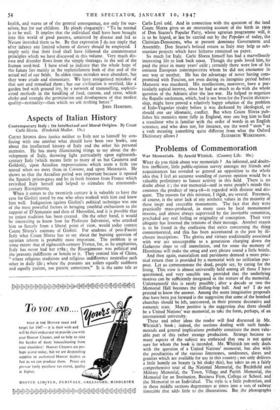Aspects of Italian History
Contemporary Italy : Its Intellectual and Moral Origins. By Count Carlo Sforza. (Frederick Muller. 15s.) CouHr SFORZA does justice neither to Italy nor to himself by con- fusing with one another what should have been two books, one about the intellectual history of Italy and the other his personal memoirs. He has many illuminating things to say about the de- velopment of Italy, throwing light particularly upon eighteenth- century Italy (which means little to many of us but Casanova and Goldoni), upon Arcadian improvisations which seem a little too unreal when we meet them in Corinne, and upon Metastasio. He shows us that the Arcadian period was important because it opened the Spanish prison-gates and let in fresh breezes from France which revivified Italy herself and helped to stimulate the nineteenth- century Risorgimento.
When it comes to the twentieth century it is valuable to have the case for Giolitti stated by one who often worked with him and knew him well. Indignation against Giolitti's political technique was one of the most powerful factors in bringing youthful enthusiasm to the support of D'Annunzio and then of Mussolini, and it is possible that an unjust tradition has been created. On the other hand, it would be interesting to know how far Professor Salvemini, who attacked him so fiercely from a liberal point of view, would today contest Count Sforza's estimate of Giolitti. For students of post-Fascist Italy what Count Sforza has to say about the burning question of agrarian reform is probably most important. The problem is to some extent that of eighteenth-century France, for, as he emphasises, Italy has never had her 1789 ; the Risorgimento was political and the peasants indifferent or hostile to it. They remind him of China, " where religious traditions and religious indifference neutralise each -other in daily life ; where the peasants are toilers equally stubborn and equally patient, too patient sometimes." It is the same tale as Carlo Levi told. And in connection with the question of the land Count Sforza gives us an interesting account of the birth in 1919 of Don Sturzo's Popular Party, whose agrarian programme will, it is to be hoped, at last be carried out by the Popolari of today, the Christian-Democrats, who at present dominate Government and Assembly. Don Sturzo's belated return to Italy may help to sub- stantiate projects which have hitherto remained on paper.
So much for Italy. Carlo Sforza himself has had a marvellously interesting life to look back upon. Though the gods loved him, he paid the price in many years' exile ; certainly there were few of his eminent European contemporaries whom he did not encounter in one way or another. He has the advantage of never having com- promised with Fascism, not even during its incognito period before Matteotti was murdered. His recollections, moreover, have a par- ticularly topical interest, since he had so much to do with the whole question of the Adriatic after the last war. He helped to negotiate the Rapallo settlement, which, had it not been for the Fascist dictator- ship, might have proved a relatively happy solution of the problem of Italo-Yugoslav rivalry before it was darkened by ideological, or should one say idiomatic, conflict. But when .Count Sforza pub- lishes his memoirs more fully in England, may one beg him to find a translator who is familiar with the order of words in an English sentence, and who does not, for instance, use the word " stem " as a verb meaning something quite different from what the Oxford


































 Previous page
Previous page